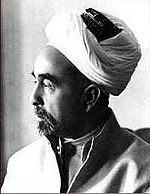Abdullah I of Jordan, Date of Birth, Place of Birth, Date of Death
TweetAbdullah I of Jordan
King of JordanAbout Abdullah I of Jordan
- Abdullah I bin Al-Hussein (Arabic: ??? ???? ????? ?? ???????, Abd Allah Al-Awal ibn Al-Husayn, February 1882 – 20 July 1951) was the ruler of Jordan and its predecessor state, Transjordan, from 1921 until his assassination in 1951.
- He was Emir of Transjordan from 11 April 1921 to 25 May 1946 under a British mandate, and was king of an independent nation from 25 May 1946 until his assassination.
- According to Abdullah, he was a 38th-generation direct descendant of Muhammad as he belongs to the Hashemite family. Born in Mecca, Hejaz, Ottoman Empire, Abdullah was the second of three sons of Hussein bin Ali, Sharif of Mecca and his first wife Abdiyya bint Abdullah.
- He was educated in Istanbul and Hejaz.
- From 1909 to 1914, Abdullah sat in the Ottoman legislature, as deputy for Mecca, but allied with Britain during World War I.
- Between 1916 and 1918, he played a key role as architect and planner of the Great Arab Revolt against Ottoman rule that was led by his father Sharif Hussein.
- Abdullah personally led guerrilla raids on garrisons.Abdullah became emir to the Emirate of Transjordan in April 1921, which he established by his own initiative, and became king to its successor state, Jordan, after it gained its independence in 1948.
- Abdullah ruled until 1951 when he was assassinated in Jerusalem while attending Friday prayers at the entrance of the Al-Aqsa mosque by a Palestinian who feared that the King was going to make peace with Israel.
- He was succeeded by his eldest son Talal.
Read more at Wikipedia
See Also
- Famous People's Birthdays on 02 February, Saudi Arabia
- Famous People's Birthdays in February, Saudi Arabia
- Famous People's Birthdays on 02 February, Jordan
- Famous People's Birthdays in February, Jordan
- Famous monarch's Birthdays on 02 February, Saudi Arabia
- Famous monarch's Birthdays in February, Saudi Arabia
- Famous monarch's Birthdays on 02 February, Jordan
- Famous monarch's Birthdays in February, Jordan


 Date of Birth:
Date of Birth:  Place of Birth: Mecca, Makkah Region, Saudi Arabia
Place of Birth: Mecca, Makkah Region, Saudi Arabia